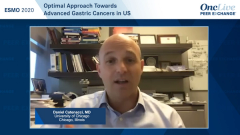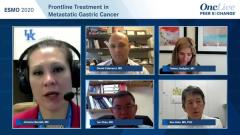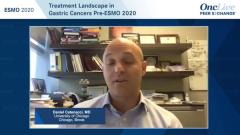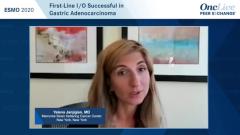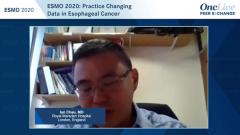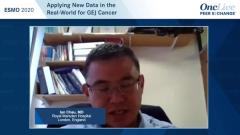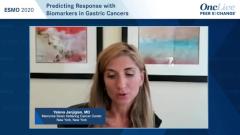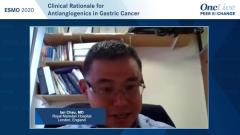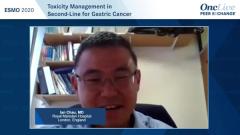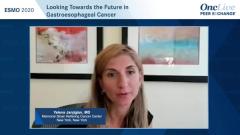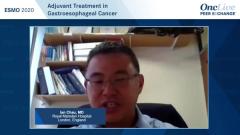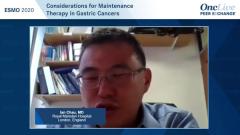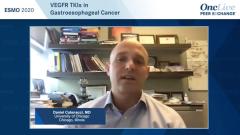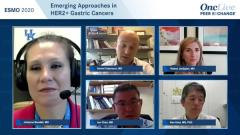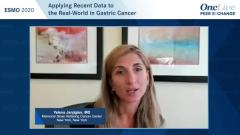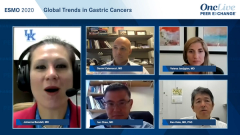
Frontline Treatment in Metastatic Gastric Cancer
Episodes in this series

Transcript:
Johanna Bendell, MD: Yelena mentioned earlier the concept of biomarker testing and making sure we test the biomarkers early. Dan, in your practice, you see a first-line patient coming in, what’s your absolute base biomarkers? Then, what’s your wish biomarker profile that you would want?
Daniel Catenacci, MD: Before yesterday, the absolute minimum would be human epidermal growth factor receptor 2 (HER2) testing. And so that dichotomy of HER2 positive versus negative in which about 10% to 15% of our patients are going to be HER2 positive. We know obviously from the ToGA study (NCT01041404) that that’s an improvement in survival by adding trastuzumab to the standard doublet chemotherapy.
What I normally do would be a panel next-generation sequencing [NGS] test to get the lay of the land of the genomic biomarkers that are available, including microsatellite instability [MSI]-high, including other receptor tyrosine kinase gene amplifications that have implications on study or even later on off label, if possible. Of course, TMB [tumor mutational burden], which we’re going to talk about later, and PD-L1 expression by immunohistochemistry. Having the understanding of all of these biomarkers helps me know what the best option for first-line is, and over the next line of therapy and plan their sequencing over time.
Johanna Bendell, MD: Dr Kato, Ken had alluded to stop and go oxaliplatin and that concept of do you use maintenance? Do you give 4, 6 months and stop everything? Do you do 4, 6 months continue? I know that this is not completely data driven, but what’s your gestalt for first line, Dan?
Daniel Catenacci, MD: For first-line, I think I’d just reiterate what Yelena and Ken said. Generally speaking, we’re talking about a doublet for permitting platinum. My preference is oxaliplatin if FOLFOX [folinic acid, fluorouracil, oxaliplatin]. Most of my patients can’t swallow when they’re first presenting, and they’re not swallowing capecitabine pills, so FOLFOX is the preferred regimen. That’s preferred. Now occasionally you’ll have patients that have baseline neuropathy from diabetes or alcohol use or whatever, idiopathic. We have data that FOLFIRI [folinic acid, fluorouracil,irinotecan hydrochloride] in the first line is as effective. That’s my preferred regimen for those patients.
Then you asked about maintenance and OPTIMOX approach, which I adopt and sort of extrapolate from the colon cancer literature; that is why I push the neuropathy. Most of my patients by 3 months in, 6 cycles, max 8 cycles, their neuropathy is going to just get worse by continuing it, and most of those patients have that point where they can afford to come off the oxaliplatin and go on a maintenance 5-FU [5-fluorouracil] or even capecitabine at that point because now they can swallow; 80% or more of them will improve their ability to swallow the pills by that point.
The only other thing I would say, Yelena mentioned the triplet regimens, the FLOT [docetaxel, oxaliplatin, leucovorin, and 5-fluorouracil] or even FOLFIRINOX where there’s now data, and that is my preferred regimen because there’s nonoverlapping neuropathy toxicity. I will consider it in patients that are heavily symptomatic that have a heavy burden of disease, younger patients, to really sort of get that initial response, extrapolating from the TRIBE data from colon where we can see that, and we already have triplet versus doublet regimens in this disease with the higher risk of toxicity. It’s always balancing the potential benefit from the treatment versus the symptoms and outcome of the patient and tailoring it to the patient.
Johanna Bendell, MD: Very good. And, Ken, I wanted to ask you, comparing to Dan’s list of biomarkers he tests. In Japan, are you doing more comprehensive profiling at baseline?
Ken Kato, MD, PhD: Yeah. We profile at baseline with the HER2 status and the MSI status. In the comprehensive data, the NGS was really robust only for the patients that fail after the standard treatment, so we conducted some trials to do the NGS up front.
Johanna Bendell, MD: Very good. Ian, when these patients present to us, Dan started to allude to not being able to swallow. How do we think about quality of life, symptomatology, use of treatment, and choice of treatment? We talked a little bit about neuropathy and affective quality of life. What’s your approach when you think about these patients with gastric cancer that tend to have very specific and serious issues?
Ian Chau, MD: I think both Ken and Yelena already mentioned that a lot of these patients are highly symptomatic. When they first come to our clinic, they already lost a lot of weight. Many of them have a lot of nutritional compromise. They may have dysphagia for a while. Certainly, at current time, we are seeing the backlash of COVID-19 [coronavirus disease 2019]. Patients have had dysphagia since March and are not able to get an endoscopy because the whole service was put on hold. Now they’re all coming in with very advanced disease.
I think it’s an important thing to reoptimize their nutritional status. Early referral and involvement from our dietetic departments and thinking apart from whether their patient is able to take in enough oral intake. Do we need to start thinking about enteral feeding, like tube feeding? Occasionally, some patients do come in where you actually need to consider total parenteral nutrition, although we will always try to have enteral feeding if possible.
Now those are the patients that really need to start treatment very quickly. And as Dan already said, you probably have to start treatment and balance whether you use a more aggressive regimen with a high toxicity with trying to result or achieve a better, higher quality response as quick as possible.
Certainly, in that situation you will need to give drugs or intravenously FOLFOX, and we probably will still not really move on. We used to use a triplet regimen, and if they can’t swallow, we would use a regimen like FOLFOX. Whereas if a patient is able to swallow, we would be using regimens like CAPOX [capecitabine, oxaliplatin] or cisplatin and capecitabine.
I think the optimization of their nutrition is very important for these patients because there are multiple quality-of-life studies that have been done, and some of the most important factors to the patients actually are appetite loss and weight loss in gastric cancer patients. That seems to come up again and that also seems to have a negative prognostic impact. People who have weight loss and appetite loss always come up as an independent poor prognostic factor. Being able to optimize that to deliver effective treatment to them is probably a very important consideration.
Transcript Edited for Clarity


